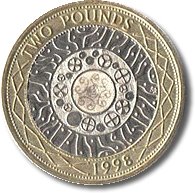 Although the coin outwardly pretends to be a mixture of gold and silver it is of course a fake, being in reality an almost worthless amalgam of copper, nickel, and zinc. Even if it were a mixture of real silver and gold, the stupidities of a specie-based bimetallic currency are well documented on Mises.org. This coin, therefore, is not only a monument to the ongoing rampage of statist monetary inflation but also a monument to Gresham's Law, which even Aristophanes in classical Greece suspected made bimetallism a useless monetary standard.
Although the coin outwardly pretends to be a mixture of gold and silver it is of course a fake, being in reality an almost worthless amalgam of copper, nickel, and zinc. Even if it were a mixture of real silver and gold, the stupidities of a specie-based bimetallic currency are well documented on Mises.org. This coin, therefore, is not only a monument to the ongoing rampage of statist monetary inflation but also a monument to Gresham's Law, which even Aristophanes in classical Greece suspected made bimetallism a useless monetary standard.So how much of a monument to British state monetary inflation is this revolting fake silver and gold two pound coin? Let's go for the silver angle first. It's all in that word, pound, still symbolised in the '£' sigil of the Latin Libra symbol for the letter 'L'. This represents a Tower Pound, which is 5,400 grains of silver, so the two pound coin is pretending to represent 10,800 grains of silver. The modern pound is 7,000 grains (16 ounces), so let's work out what the two pound coin should be worth, in a modern silver price:
(I'm afraid Mathematics isn't my greatest strength, so if there are any holes in my calculations below, please do let me know.)
(Silver @ £5.92 per oz) * (16) * (10,800/7,000) = £146.13 pounds
So the British state, in its many guises from the Henry VIIIth onwards, has got the British pound down to 1.37% of its original silver value. It's taken them a while to do it, but with the EU's officially mandated target of monetary supply growth of at least 4.5% per annum, expect it to go under 1.0% in around eight years or less, which will be an achievement to be proud of for whichever Chancellor manages it.
Seeing as this is a bimetallic coin, which is based upon an original two pound gold British coin of 1820, which weighed 0.4708 Troy ounces in gold, let's see if it gets any better looking at it from a golden point of view, after heroes like Sir Isaac Newton introduced a gold standard once earlier British governments had corrupted the silver standard. Now if I've got this right, a Troy pound is 5,760 grains, which is divided into 12 Troy ounces. A standard gold price ounce is 437.5 grains compared to a Troy ounce of 480.0 grains, so we have to do some further mathematical jiggery pokery. Let's see if my maths has improved:
(Gold @ £315.87 per oz) * (0.4708) * (480.0/437.5) = £163.16 pounds
So this time the British government has done even better, since coming off the Newtonian gold standard; they have devalued the pound to just 1.23% of its reborn pristine golden value. Assuming a money supply growth figure, again, of 4.5% per annum, expect the inflated pound to go under 1.0% of its original value in less than five years.
Outstanding.
I wish they would just make these bimetallic two pound coins out of orange and green plastic and then we would all know where we really stood in relation to the counterfeit currency in our pockets; if they stamped them with the head of Homer Simpson it would be even better:
 Now that really would be a currency to collect. We could have Bart in yellow and red, for the new pound coin, and Marge in blue and pink, dressed as Britannia, for the new fifty pence coin; the cartoonic possibilities are endless.
Now that really would be a currency to collect. We could have Bart in yellow and red, for the new pound coin, and Marge in blue and pink, dressed as Britannia, for the new fifty pence coin; the cartoonic possibilities are endless.
5 comments:
That's brilliant! You took me quite by surprise with the new look coin - I imagine them coming out of ATMs like winnings on a Las Vegas slot machine!
Something I have wondered (but not really thought through), is what would be the result of the UK again adopting, say, the gold standard whilst everyone else continued on their merry fiat way? How would that affect money markets and so on?
Discussing this with a friend yesterday. I pointed out how the currency unit was worth less than 2% of its value since H8ths time.
She said, yea but.. We are still an aweful lot more affluent today than then. Yes, there are the super rich, the Barons then and today, the King of Saudi or Warren Buffet for example. But the increase in wealth to most of the population appears to have occurred since the second world war. Just when inflationary policies really started to take off.
Is it possible to rebut the claim that the generally inflationary policies persued since 1945 are the cause of todays relitive affluence?
I mumbled something about cheap energy and greater automation (a higher degree of innovation) having more to do with our affluent circumstance than inflationary government policies.
Well, the market survives despite the predations of government. It is not because of government that we have grown wealthier, but in spite of government.
I'm currently running a conference in Dublin, so don't have time to write a decent answer. But you probably want to get hold of Hoppe's 'Democracy: The God that Failed'. For a taster in the general area you're interested in, go to this page:
http://www.mises.org/hoppeintro.asp
Read the whole thing, but you're probably most interested in the paragraph's starting:
While history will play an important role...
As to your friend, you'll notice that throughout the Victorian Age of the gold standard, average wealth rose incredibly. As soon as we came OFF the gold standard, we went straight into two world wars, a cold war, lived under the constant threat of MAD annihilation, the 1970s, and more financial booms and busts than you could shake a banana at, the worst being the 1930s, swiftly followed by the post-2000 Internet crash.
If that is success, compared to the never-ending growth of the Victorian age, then please give me failure. (And this was despite the British Victorian government deliberately trying to instigate wars, such as the hilarious Crimean War, in order to revive the Income Tax and government growth - Gold kept the buggers in check).
Gotta go, I'm afraid - Clients demanding service...
Is it not as simple as point out that inflation never makes anyone richer?
What it does do is allow government to spend more in the short term, effectively borrowing against the country's future earnings without it actually showing up on the books as borrowing. So the people at the top of the inflation chain make short term gains, whilst those at the bottom (the general public) make a loss as their wages are devalued to compensate for the increased supply of money.
You are right, mechanisation, industrialisation, computerisation, etc. are the processes that have made us richer, however we would be richer still if the money we earnt was not continually devalued.
I'm sure Jack could explain it better than me and correct me if I'm wrong, but I think those are the general points.
What was the chance of that! Well, what Jack said too.
Post a Comment